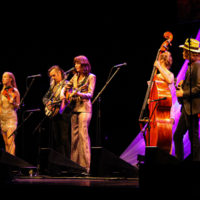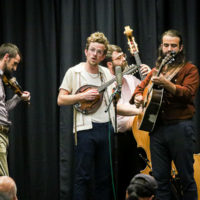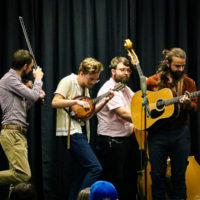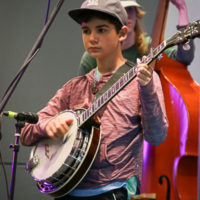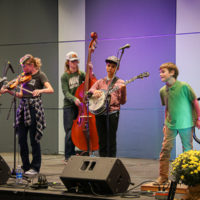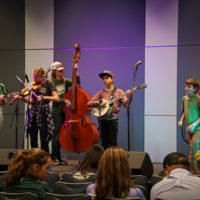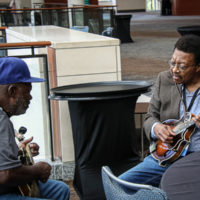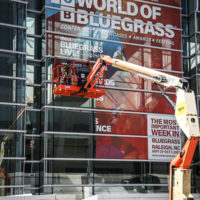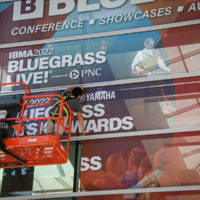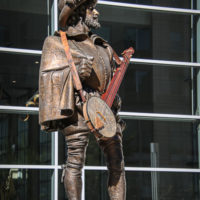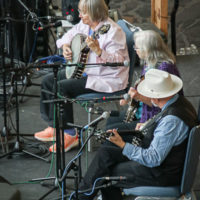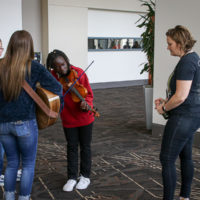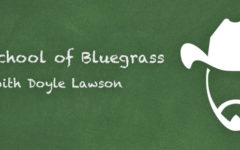
The sun sets on the 2022 World of Bluegrass – photo © Frank Baker
As the 2022 IBMA Awards and live performances kicked off, Hurricane Ian began its approach on the West Coast of Florida, eventually smashing into Fort Myers. The hurricane then moved north and east. Meanwhile, in Raleigh, North Carolina, on Thursday, September 29, it was rainy, but mostly mild. I arrived to cover the awards and shows. What follows are highlights of the week: a sampling of the shows, various talks, conferences, booths displays, and other activities that took place.
I arrived with my wife, Arielle, at the Duke Energy Center, where the awards were held. As we walked across the street from the parking lot, we saw members of Molly Tuttle’s Golden Highway just behind us. Fiddle player Bronwyn Keith-Hynes and bassist Shelby Means, bedecked in sparkling dresses that would also fit in at the Grammys, were flanked by mandolinist Dominick Leslie and banjoist Kyle Tuttle, looking sharp in their funky attire. They followed us as we walked to a dead end, then we tracked back only to mistakenly enter the concert hall through the red-carpet doors.
But what a mistake it was! As we strolled in, we saw a sea of bluegrass royalty standing in the waiting area, seeing old friends, and exuberantly talking. Ronnie and Del McCoury were holding court, as members of the Po’ Ramblin’ Boys strolled by. Doyle Lawson and Jim Lauderdale, in studded Western suits, greeted old friends. It was like I died and went to bluegrass heaven. It was magical.
After Arielle and I grabbed a drink, taking in the atmosphere, Peter Rowan made his entrance arm-in-arm with his daughter, son, and girlfriend and was soon whisked away by the IBMA folks to take pictures on the red-carpet.
The IBMA Bluegrass Awards were hosted by Dan Tyminski and Ronnie Bowman. In the spirit of the Grammys, they entertained the audience with jokes and funny repartee as they announced the winners of the various awards. Here is full list of the 2022 award winners.
I was deeply moved by the inductions of Norman Blake, Peter Rowan, and Paul “Moon” Mullins into the Bluegrass Hall of Fame, class of 2022.
Norman’s acceptance speech was videotaped. He said that, at eighty years old, he doesn’t travel so well these days. I’ve long been a fan of Norman Blake, having fallen in love with his music when I first heard his album, Back Home in Sulfur Springs, forty or so years ago. I connected with Blake’s downhome lyrics, reminiscing about his days growing up in Sulfur Springs, Georgia, hearing the trains running through the town.
Oh if I could turn backward the cold hands of time
To a bright blue yesterday
And listen for the whistle of old 41
As she rolls along on her way
Although I didn’t grow up in the country, or in the South, the wistful lyrics painted a picture that seemed familiar. The trains suggested the faraway places that they traveled to and from, making the world seem larger. Of course, Blake’s incredible flat-picking absolutely blew my mind. After hearing that album, I went out and bought nearly all his albums, including his collaboration with Peter Rowan and Don Edwards on High Lonesome Cowboy, and two collaborations with Tony Rice. In his speech from Rising Fawn, Georgia, Blake said, “When I was a little ol’ boy running up and down the railroad tracks here in Sulfur Springs, Georgia with a fourteen-dollar Stella guitar, I never dreamed that something like this would come my way. But we never know what life holds, I guess, when we start out.”
My musical interests grew in the time of Norman Blake. I am emotionally connected to his material. Hearing his acceptance speech hit me right in the heart. Blake’s music also enticed me to dig deeper into bluegrass. Growing up in New York City, I was not immersed in bluegrass. After hearing the Stanley Brothers blasting out of my brother’s dormmate’s room at Columbia University, I was hooked. I then explored related artists and early innovators, like Bill Monroe, Roy Acuff, and others. I eventually found my way to Norman Blake. Bluegrass music is great music, period. Anyone with an ear for music knows this.
Peter Rowan opened his induction speech saying, “If you see a turtle on a fence post, you know that someone helped him get there,” which was met with chuckles. Peter’s speech was both heartfelt and funny. When I talked to him the next day, I asked him what Bill Monroe would have said about his induction into the Bluegrass Hall of Fame. Imagining Monroe’s response, Rowan said, “Like I told you Pete, ours is a great music, it will be good to you down the line if you stick with it!” He then added, “Bill told me when I was 22, don’t ever give up. I’ve found out the truth in that. Monroe said, ‘A man’s got to be a powerful driver. You have got to keep a team of horses working together, moving together, steady on! It’s a powerful music!’ I feel now that I’ve lived up to Bill Monroe’s hopes and expectations for me.”
After Peter’s speech, he performed with his band, the Peter Rowan Bluegrass Band. As Christopher Henry (mandolin) was standing in at the Murphy Method booth elsewhere, he was substituted by the young mandolin prodigy, Wyatt Ellis. Along with Molly Tuttle, they performed one he wrote with Bill, Walls of Time.
As Wyatt has said, “I’ve always loved Peter’s music, his special voice, and after being around him for a few days I know what a special spirit he has,” adding, “and I’m very thankful to Christopher Henry, my mentor, for believing in me.” Even with all the innate talent someone may have, sometimes they need to get perched atop a fence post to be seen and heard.
I knew Paul “Moon” Mullins least of the inductee group. That said, Dan Hays, former Executive Director of the IBMA, and Paul’s son Joe’s, stories were very eye opening and illuminating. Hays described the diaspora of folks who left Kentucky, poor and desperate, to find work, bringing their music to nearby states, like Ohio and Indiana. In cities like Cincinnati and Dayton, they found themselves outsiders, “For the way they talked, for the way they ate, and that strange twangy music that followed us around,” said Dan Haynes.
While much of the country labeled bluegrass music as backwards and hillbilly, Paul Mullins served as an ambassador of the music, as a radio broadcaster and fiddle player, communicating it to new audiences. Bluegrass thus moved out of the world where it was born, first spreading throughout Ohio, then throughout the country and finally throughout the world. In fact, I am part of bluegrass groups that have members from all over the United States, Sweden, Norway, the Czech Republic, Italy, Japan, India, and elsewhere.
Dan Hayes’ presentation reminded me how Neapolitan folk songs, like ‘O Solo Mio, were deemed spaghetti music and likewise mocked, like the poor folks they represented who’d left their country for work in the United States and elsewhere. When Enrico Caruso sung the Canzone napoletana, as the form was called, he christened them as required material for any opera singer. In a like manner, Mullins showed the world that only a great musician can play bluegrass, and only the best can play it at a high-level.
Dan Hays’ and Joe Mullin’s speeches solidified why I connected to the hardscrabble lyrics of Norman Blake, the Stanley Brothers, and other groups. Although the cultures were far apart, both bluegrass and Neapolitan folk music were concerned with longing for the places people came from, having been swept away by diaspora due to poverty and hardship. And both forms of music require virtuoso level skill to perform.
While the performers played only a few songs at the Bluegrass Music Awards, they had hour-long sets at the IBMA Bluegrass Live show on Friday, September 30. The hurricane’s impact on Raleigh picked up steam at this point, but it was more of a squall than a hurricane. I drove with Arielle my wife into the blustery wind and rain to the Duke Energy Center. The performance had been moved from the outside Red Hat Amphitheater to inside due to the weather. The hall was packed.
The performances at the IBMA Live show were stellar. Twisted Pine and Balsam Range opened, elevating the level of the performances that followed. The Peter Rowan Bluegrass Band came to the stage fired up by Rowan’s induction. Opening with My Walking Shoes Don’t Fit Me Anymore, they went on to perform Bill Monroe’s I’m Blue, I’m Lonesome. In both of these songs, Peter’s vocals, mainly with Christopher Henry and Max Wareham, blend beautifully. As Peter said to me later, “They’ve done the work,” emphasizing that their harmonies have resulted from the time put in touring and rehearsing.
Having played with the band previously, Rowan called wunderkind, Wyatt Ellis, thirteen-year-old mandolin player to the stage to perform Frog on a Lily Pad. As Christopher Henry said, Julia Labella named the song when she heard Bill Monroe playing it.
I should mention that Christopher Henry comes from a lineage of bluegrass players. Henry’s mother, Murphy Henry, invented The Murphy Method, whose booth has been a steady feature of the IBMA trade show for the last 30 years. From VHS to DVD to streaming media, it is possible that no other company has really taught more people how to play bluegrass by ear, especially banjo. Murphy also had her two books for sale, one on teaching banjo and the other the definitive history of women in bluegrass. Making its first appearance this year at the booth was the new tribute CD featuring 25 women in bluegrass picking and singing most of Murphy’s best material.
Following the Peter Rowan Bluegrass Band, Molly Tuttle and Golden Highway took the stage, also inspired by their awards. Molly Tuttle won Female Vocalist of the Year and Bronwyn Keith-Hynes won Fiddle Player of the Year. Watching their performance, it was evident to me why Molly Tuttle and Golden Highway are receiving accolades from the bluegrass community. Yes, they are beautiful, and young, and yes, they look fancy, but man, they can play and sing harmonies like the best of them. On Songs like Nashville Mess Around, Keith-Hynes, dressed like a mermaid in her shiny bell bottom pants, played fiddle like the devil was on her trail, chasing her with burning flames.
Showing their admiration for the traditions that have preceded them, the band played John Hartford’s Way Up On Hill. But this was no mere imitation. The band played it as their own, having fun with Hartford’s hoots and yodels, as Kyle Tuttle expertly delivered Hartford style funk in his vocal performance.
The IBMA Bluegrass Live show was brought home by Jerry Douglas and his new band. I was especially blown-away by Mike Seal, who is primarily a jazz guitar player, but can play any kind of music.
The IBMA World of Bluegrass was overall an inspired music event. While the sessions and performances harkened back into the past, we saw that bluegrass music is in good hands, with the likes of Molly Tuttle, Christopher Henry, Wyatt Ellis, Sierra Hull, and so many other younger players who will carry our music forward to the future.
You can watch the entire 2022 IBMA Bluegrass Music Awards online.
Photos © Frank Baker.

